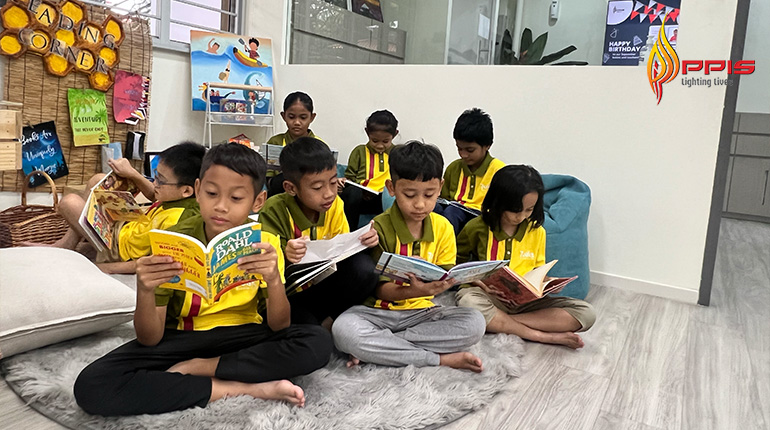Understanding Family Therapy: Why It Is Important
September 17, 2024
Understanding Family Therapy: Why It Is Important

PART 1 – INTRODUCTION
Our family members play a crucial role in building us up. Their support provides us with a safety blanket, nourishes us, and helps us grow to become our best and truest selves. However, maintaining family harmony takes hard work, thoughtful communication, and an ability to see problems from different perspectives. Every member must learn the right skills and establish healthy approaches to promote harmony within the family.
But these may not be skills that everyone develops naturally. Sometimes, families may require external intervention from a trained professional to guide loved ones who encounter challenges connecting with one another. This is where PPIS Sym Academy’s Family Therapy Services can help! Our therapists offer support in strengthening family bonds through safe, non-judgemental family counselling sessions. Let us share more about this process so that you can have a better understanding of whether your family requires therapy.
PART 2 – UNDERSTANDING FAMILY THERAPY
2.1. How Does Family Therapy Work?
What can you expect when you attend family therapy? This is a legitimate question our therapists frequently receive, and it is one we seek to address. Family therapy, at its core, is a form of talk therapy that aims to enhance communication among families, resolve conflicts, and strengthen relationships.
At PPIS Sym Academy, our sessions are carried out by trained professionals with specialised knowledge in family dynamics, psychology, and counseling techniques. Our therapists will consider all the information the family brings to them and the insights they gain from the first meeting to establish a personalised treatment plan to address the family’s needs.
The session can focus on various issues, such as parent-child conflicts, marital and financial issues, or the effects of mental illness or substance abuse on the individual and family. Regardless of the discussion at hand, family therapy can help improve strained relationships.
Many attending family members often find enormous value in working through their issues alongside our trained professionals. This is because our therapists can provide an objective third-party viewpoint, pointing out blind spots and helping loved ones identify the primary source of their issues. Subsequently, our therapists will work with all parties to find a solution to these problems.
2.2. The Main Purpose Of Family Therapy
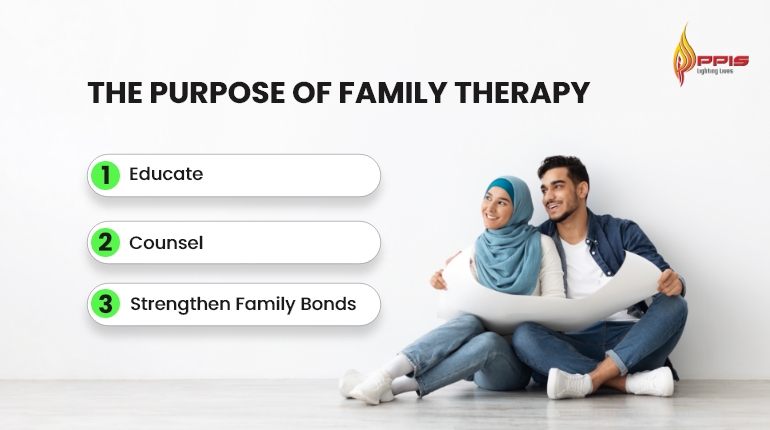
People seek family therapy for different reasons. Their objective might range from healing and reconciling a relationship to exploring misunderstandings and preventing further conflict. While various family issues require different approaches to address them, the primary tenets of family therapy are to educate, counsel, and strengthen family bonds.
1) To educate
Family conflicts stem from various reasons ranging from disappointments, hurtful experiences, and even misunderstanding during attempts at communication. Our therapists can help individuals and families navigate these challenges together.
Part of therapy also involves Psychoeducation which may include a deeper understanding of mental health struggles, addiction, or the impacts of trauma that a family member may have experienced. Our therapist can help navigate questions like:
- What are the struggles my family member is facing?
- What can family members do to help with these challenges?
2) To counsel
Our family therapists will facilitate open communication, identify and address underlying issues, mediate conflicts, and provide emotional support to each member of the family. They would work collaboratively with their clients to set realistic goals that would mutually benefit one another. This would be done through a combination of education on effective communication, emotional regulation, and problem-solving skills.
3) To strengthen
A healthy family dynamic emphasises connection, connectedness, and a harmonious relationship. At PPIS Sym Academy, our therapists offer a safe place to help families develop deeper bonds, better communication skills, inner resilience, and coping strategies to manage lifestressors.
2.3. Issues That A Family Counsellor/Therapist Can Help With
Family therapy can help to address relationship and family issues, mental health conditions, and interpersonal well-being, among others. However, the idea of coming for therapy may not sit well with some family members as they may not feel comfortable sharing detailed personal matters with a stranger. Meanwhile, others might feel shameful, guilty, or embarrassed. Hence, they might avoid seeking the help of a family therapist.
Having initial conversations with the therapist about the purpose and expectations of family therapy itself can help in allaying some of these anxieties or concerns. With a proper understanding about what family therapy is, family members may adopt a more open-minded perspective about coming for therapy. Read on to learn about the issues that our family counsellors/therapists can help you address.
1. Mental health

Mental health issues remain a sensitive topic that many Singaporeans are hesitant to openly discuss. As such, some families face difficulties coming to terms with and understanding the issue. During our family therapy sessions, our therapists can offer strategies to help families adjust to and cope with any psychological changes a family member is experiencing.
2. Major life transitions
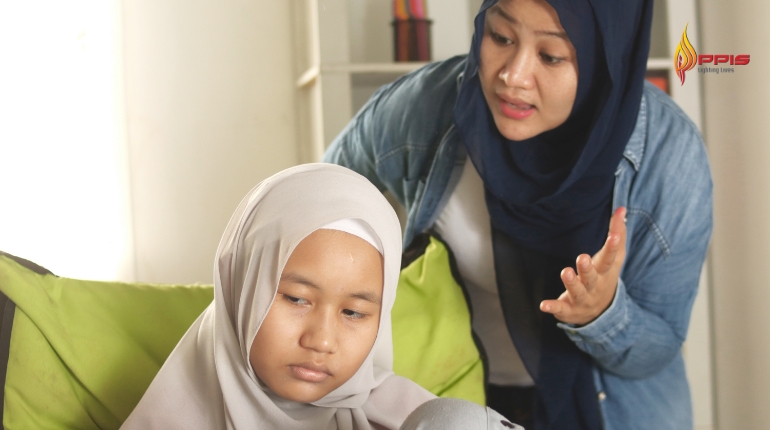
Major life transitions can be stressful to navigate and difficult to adjust to. Even if a change doesn’t directly impact children, such as a new job for a parent, it can cause stress or instability. For example, a new job may result in increased work hours, stress, changes to family routines, or income changes.
Some of the biggest life transitions may include:
- The birth of a new child
- A divorce or separation
- A chronic illness or serious health problem
- Grief or loss within the family
A family therapist can provide a safe space for family members to discuss concerns, express emotions, and create avenues for re-connection despite a period of change or disruption.
3. Divorced/Stepfamilies

An impending divorce affects not just the couple but also the children and extended family. Such challenges may be further complicated when either parent remarries. Our family therapists can help families cope with the stress of divorce and guide stepfamilies in transitioning to a different lifestyle and family dynamic.
4. Financial distress

With soaring prices and rising inflations, many families in Singapore may face economic hardship and uncertainty within the coming months. This may even result in severe disruptions to the family dynamic. For instance, a stay-at-home mum might be forced to return to work to help the family financially. Hence, such changes may cause the children to experience confusion and stress as they adjust to the situation.
Our trained professionals can help families learn to cope with financial distress. During the family therapy sessions, they can help identify and offer coping solutions to issues arising from financial strain, such as stress and anxiety.
5. Anger management

It is common for loved ones to have disagreements with each other. However, we need to learn to identify signs of anger to be able to manage our emotions effectively. If you leave it unaddressed, the anger may become chronic, intense and even problematic.
If you notice you are having frequent arguments with your family members, often with little to no resolution, you need to consider attending family therapy. Through our family counselling sessions, you can learn to manage anger effectively. Therapy also provides you with safe and healthy ways to deal with the problems behind the anger.
Some of the other broader issues our family counsellors can help with include:
- Building trust between every family member;
- Conflict resolution and reconciliation among family members;
- Encouraging family members to forgive each other for past mistakes;
- Fostering an empathic and supportive family environment;
- Helping every family member move on from painful pasts;
- Identifying and managing the source of stress and tension within the family dynamic;
- Maintaining honesty between family members.
Learn More: Family Therapy Tips: What To Do When You’re Angry At Your Family Members
PART 3 – HOW THERAPY CAN HELP YOUR FAMILY RELATIONSHIPS
3.1. When Should You Seek Family Therapy?
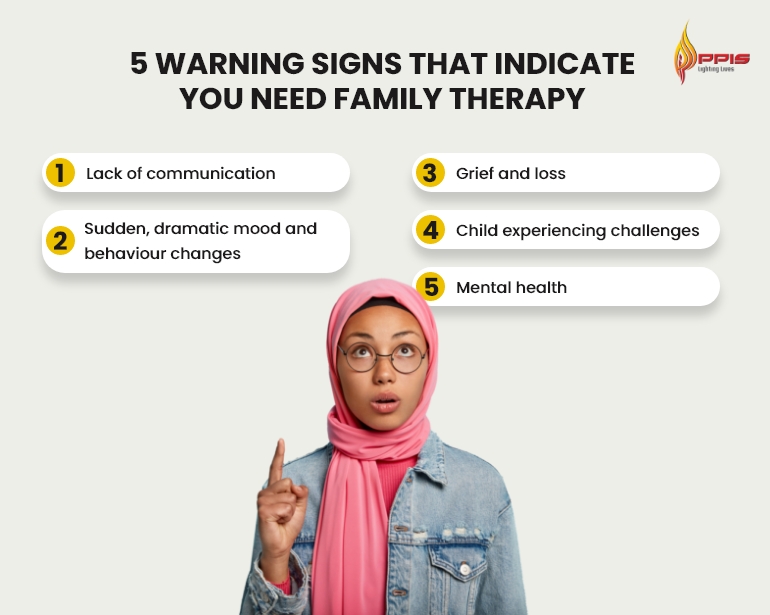
All families experience rough patches from time to time. A healthy and stable family can work through these issues sensibly to ensure brighter days ahead. However, if these rough patches last for months with no resolution in sight, it may be a sign that your family needs professional therapeutic support to work through your relational issues. Here are some warning signs to look out for.
Sign #1: Lack of communication
Communication is critical for resolving misunderstandings and conflicts in families. Communication issues may appear differently across various families – some avoid speaking altogether, while other families have members talking over each other without truly listening.
If you find it more challenging to communicate your needs and preferences with each other, or feel unheard more often than usual, you may wish to seek family therapy. Effective family therapy can help improve communication patterns and facilitate meaningful dialogue.
Sign #2: Sudden, dramatic mood and behaviour changes
Are family members exhibiting extreme mood swings or significant changes in behaviour? This could range from excessive anger, fear, or sadness to noticeable depression. Such shifts in mood and behaviour often indicate underlying issues that may need addressing. Family therapy can provide a space for family members to explore and understand these changes, uncovering potential sources of frustration and facilitating healthier coping strategies.
Sign #3: Grief and loss
Grief and loss, such as the death of a loved one, divorce, separation, or an exposed affair, can profoundly impact the family unit, particularly on the children. These events can leave lasting effects and make it difficult for the family to adjust. Family therapy can assist in processing grief and adapting to new realities, helping all members find ways to support each other through challenging times.
Sign #4: Child experiencing challenges
If a child is showing frequent absences or is perceived to have ‘disruptive behaviours’ at school, it may indicate deeper underlying problems. Family therapy can support the child and allow the family to explore the cause of these difficulties – changes in family structure (e.g. divorce, new-born baby, loss/death etc), learning difficulties, challenges in friendships, or emotional regulation. Therapy can also offer strategies to help children and families navigate these challenges effectively.
Sign #5: Mental health
Mental health issues can be challenging for both the affected individual and their family. In many cultures, discussing mental health remains a sensitive topic, which can hinder individuals and families from seeking appropriate support.
Family therapy offers a supportive and collaborative space to address mental health concerns. It is done by fostering a deeper understanding of how mental health concerns impact family relationships (and vice-versa). It also offers strategies to improve mutual communication and support among members of the family.
3.2. Benefits Of Family Therapy
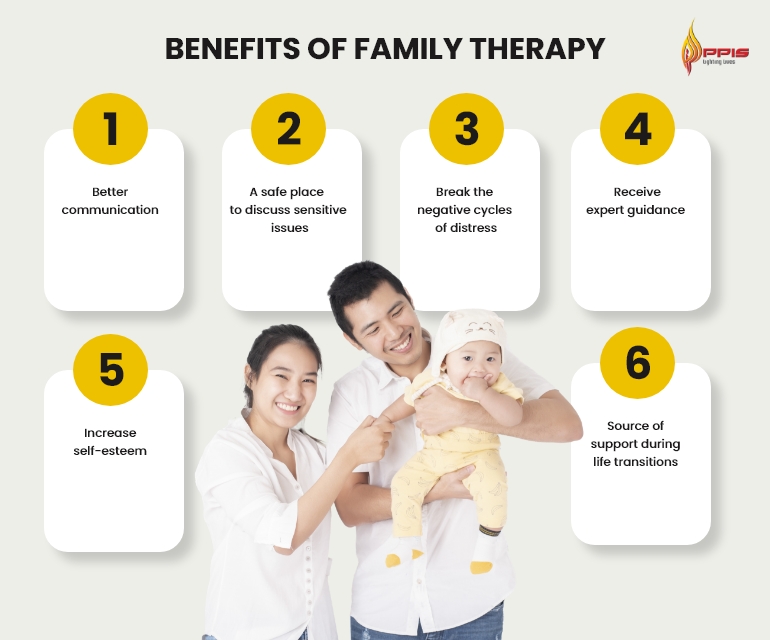
It is understandable that you might feel uncomfortable or emotionally exposed when working with a family therapist. Rest assured that such raw feelings or feelings of vulnerability are a normal part of the process. Unfortunately, some allow the fear of confronting their authentic emotions to stop them from seeking the help they need.
However, it is vital to know that family therapy is a healthy decision that allows your family to better understand and appreciate one another. During these sessions, you can expect to:
- Learn how your family expresses emotions and solves problems;
- Develop new skills and learn healthy ways to interact and relate to each other;
- Discover your family’s values, strengths, and areas of improvement;
- Identify your family’s challenges and learn how to handle them;
- Learn how family behaviour patterns, roles, and rules can contribute to conflict and how to resolve it;
- Learn how to achieve the goals you set for yourself and your family.
Furthermore, there are various benefits when you attend PPIS Sym Academy’s family therapy sessions. Read on to learn more!
Benefit #1: Better communication
Many misunderstandings stem from poor communication. Some might find it challenging to share their feelings openly or face communication difficulties in a larger group, such as a family. If you are in a similar boat, family therapy can provide you with the tools and insights to speak to your family members and understand them more effectively.
Throughout the sessions, you can learn ways to enhance your communication with family members, helping them express their thoughts and feelings more effectively. This will facilitate meaningful conversations, leading to fewer misunderstandings and more harmonious relationships.
Benefit #2: Provide a safe place to discuss sensitive issues
It is often tempting to put off hard conversations with our family members, as we fear raising such issues that may cause long-term damage to the relationship. Family therapy can provide a safe environment to broach challenging topics without fear of judgement.
Family therapy offers a safe space for members to share their emotions and experiences. This validation and emotional support can strengthen bonds and build empathy, helping family members feel more connected and understood.
Benefit #3: Break the negative cycles of distress
When our mind and heart is in distress it can be a challenge to think and communicate clearly. Family therapy can help you break negative cycles of distress by addressing and transforming unhealthy interaction patterns within the family. These patterns, often developed over time, can be hard to change on your own. Through therapy, family members learn healthier ways to relate, connect, and communicate, leading to more positive and supportive family dynamics.
Benefit #4: Receive expert guidance to resolve complex family issues
Family conflicts can be very complex to address because they involve the experiences, values, and struggles of multiple people. Issues often escalate and negatively impact family dynamics when members use “unhelpful” ways to resolve them. Family therapy offers expert guidance to navigate complex decision-making, teaching families how to negotiate effectively and find a fit for all members involved.
Benefit #5: Improve self-esteem
A lifetime of disapproval and gaslighting can deeply damage self-esteem, often leaving individuals unaware of the root cause. Family therapy helps uncover and resolve these underlying issues, allowing affected members to start feeling better about themselves. Overcoming such challenges within the family can become a source of pride and strengthen self-worth.
Additionally, therapy fosters the understanding that family issues are rarely the fault of one person. This can be a start to a cathartic healing process and help to enhance the overall self-worth of those impacted by poor family dynamics.
Benefit #6: Source of support during life transitions
Life transitions such as divorce or the loss of a loved one can strain relationships and cause significant stress within families. Family counselling offers crucial support during these difficult times, helping each member cope and adjust to their new circumstances. Our therapists are dedicated to supporting individuals through their unique challenges, ensuring the family unit can adapt and continue to function effectively.
PART 4 – FAQs ABOUT FAMILY THERAPY
Although it is becoming more common for Singaporeans to attend family therapy, there are still many who are unfamiliar with it and may understandably have questions about the process. If you still have several lingering questions after reading our guide on family therapy, here are the answers to some of the most frequently asked questions our family therapists received.
Question #1: How long does each session last?
Our family therapy sessions typically last between 45 to an hour. Our therapists will seek to understand your specific therapeutic needs and establish a regular schedule for consultation. They may also extend the session if they deem it necessary.
Question #2: How many sessions does my family need to attend?
As each family is unique, the number of therapy sessions varies based on several factors. Amongst which includes the severity of the issue, the individual and collective needs of the family, therapy goals, the family’s willingness to actively participate during the sessions, and their readiness to respond differently and effectively with each other. Therefore, there are no fixed number of sessions, and the frequency alone does not determine a favourable outcome.
Question #3: Will what I share be kept private?
In reference to our professional obligations and ethical practices, all conversations and any written record pertaining to our sessions are kept confidential and may not be revealed to anyone without your consent, except where mandated otherwise by the law. Examples include cases of child/elder abuse, family violence or situations that present imminent danger to yourself or others.
Question #4: Why should the entire family attend therapy?
Each family member plays a unique role in maintaining family stability and cohesion. As such, family therapy is most effective when all family members participate. This will help to uncover and address underlying patterns that affect how family members relate to each other.
By involving the entire family, we can better understand these dynamics and identify how each member contributes to both the challenges and the solutions. This collective approach fosters open communication, resolves conflicts, and builds stronger, healthier relationships.
When everyone is engaged in the process, we can collaboratively work towards meaningful change. Furthermore, we can create a supportive environment that benefits each individual and the family unit as a whole.
Question #5: What happens if a topic arises that is unsuitable for children to hear/not child-friendly?
In family therapy, we prioritise creating a safe and appropriate space for everyone involved. If a topic arises that isn’t suitable for children, we will handle it with sensitivity and discretion.
We may shift the focus to a more age-appropriate discussion or address the issue in a way that’s mindful of their developmental stage. The goal is to ensure that all members, regardless of age, feel comfortable and understood while still making progress.
We can also offer separate sessions or resources for adults to explore more complex issues privately. This approach helps maintain a supportive environment and respects the emotional needs of all family members.
Question #6: Can I stop the counselling service at any time?
Yes, you can choose to stop the counselling service at any time. Therapy is a collaborative process, and your comfort and readiness are crucial. If you feel that you have met your therapeutic goals, no longer require the support, or simply want to take a break, we can discuss your concerns and plan a transition that works for you. Our goal is to support you and your family in achieving your desired outcomes, so your autonomy and well-being are always respected.
Question #7: I wish to work on my marriage, but my spouse is not keen to attend. Can I attend alone?
Yes. Ideally, both spouses should attend therapy sessions to address marital issues together. However, if your spouse is not ready to participate, you can still attend the sessions on your own.
Individual therapy can be effective for exploring your feelings, developing coping strategies, and gaining insights into relationship dynamics. While having both partners involved can enhance the process, focusing on your growth and understanding can also positively influence the relationship. Often, the insights and changes you make may encourage your spouse to reconsider their involvement.
Meanwhile, encouraging your spouse to join the therapeutic process where possible can further deepen the work and facilitate mutual understanding in your relationship. Nonetheless, even if your spouse is not ready to participate, therapy can still provide valuable tools and clarity that benefit your marriage.
PART 5 – CONCLUSION
If you are reading our article, it means you have recognised that you may require family therapy, and you are taking the first step towards fostering a healthier family unit. This decision reflects a tremendous amount of courage, and we commend you for your commitment to improving your family’s well-being.
We hope what we have shared has provided you with a better understanding of what to expect when you attend family therapy. Remember, help is always available, and you need not deal with your family issues alone.
If you believe the situation with your family can be made better with family therapy, do not hesitate to reach out to us or visit https://ppis.sg/sym/ to indicate your interest in our therapy sessions.

